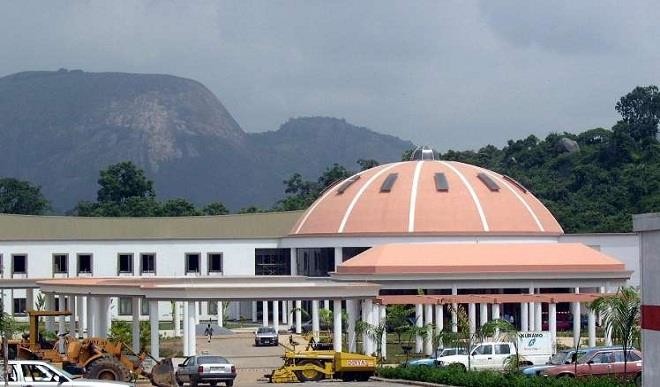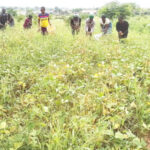
As the seat of Nigeria’s Presidency, the State House Abuja which also enjoys the title of Aso Rock Villa, is always in the news. However, in the past fortnight or so, its capacity to attract public attention was upped perhaps for the wrong reasons – depending on the inclination of the observer. At least four sketches were painted by an equal number of actors which helped to peel away part of the mystique that usually surrounds this ordinarily forbidden structure, the sight of which is not even allowed the ordinary Nigerian citizen to behold.
First on the schedule was the now widely criticised interview granted the BBC Hausa Service by Mrs Aisha Buhari, the wife of the President, in which she lamented publicly over her personal misgivings about the style of administration of her husband. The public take on it has largely betrayed the failure of pillow talk, between the first couple.
Secondly was the rather hasty response from her husband who stood on the world stage in faraway Germany to define for her, a role that confines her officially outside the power play and governance in the country. Both developments also point to the fact that after all, Aso Rock residents also cry. And as mysterious as the place is, there also exits the ‘other room’ ostensibly for ‘special operations’. Since the president did not divulge its purpose when ‘revealing’ its existence, such has therefore been left for the readers’ imagination.
At least it is assuring that the common tiffs between husband and wife also play out in the domain of the first family. This means that occupancy of Aso Rock does not automatically freeze their humanity beyond feeling. Indeed, man, in and out of Aso Rock Villa, ‘no be wood’.
In any case the first couple was not to be outdone as one of Nigeria’s foremost newspaper columnists Dr Reuben Abati introduced a new dimension to life in Aso Rock Villa through his piece tilted ‘The Spiritual Side of Aso Villa’. In that piece he cited the possibility of witches and wizards occupying the territory and infecting successive leaders with sundry curses including strange illnesses, hypnosis and even sudden death. His piece therefore exposed the esoteric side of the place, which effectively changes its status to ‘Aso Haunted House of Horrors’, especially with respect to its association with series of inexplicable developments including personal misfortune and deaths for its occupants. Hence by Abati’s account Nigeria’s Presidential lodge has a dark and sinister side which may render it unsafe for occupation. And given the author’s specific reference to the attribute of the premise to compromise the decision-making capacity of our leaders, Aso Rock Villa may not be the safest domicile for our dear President Muhammadu Buhari.
Abati’s take on the Aso Villa was further accentuated through the write up by Femi Fani Kayode in his own piece titled: Abati’s ‘Aso Rock Spirits’, Buhari’s ‘Kitchen Wife’, And The Curse Of Power’’. Fani Kayode claimed to concur with Abati based on his own personal experiences having served in Aso Rock for three years. He also veered into history to mention personal tragedies of past leaders which he referred to as their sacrifice for leadership. By this he effectively expanded the haunt on the country’s leaders beyond the Aso Rock days into antiquity, thereby raising the suggestion that a stint at leadership of this country may intrinsically be a macabre dance – indeed a suicide mission.
The immediate follow up question then is with all the fuss that is associated with the life and death, why do people scramble to climb into the Aso seat of power? For instance beyond the colonial rulers who were literally posted by the Colonial Office to their duty posts in Nigeria, all the indigenous leaders virtually hustled for the seat. Between 1954 and 1966 when the triumvirate of Dr Nnamdi Azikiwe, Alhaji Ahmadu Bello and Chief Obafemi Awolowo held sway in Nigerian politics, the jostle for the prime seat of power was never a picnic, as it was a life and death matter. They were however replaced in 1966, by an armed take-over of power by gun-toting soldiers through whom came General Aguiyi Ironsi. His regime eventually fell to the General Yakubu Gowon power group which prosecuted the Nigerian Civil War of 1967 to 1970. In 1975, Gowon was overthrown by the General Murtala Mohamed regime, which in itself was destabilised by the 1976 Colonel Dimka led coup that ushered in the General Olusegun Obasanjo administration.
Obasanjo handed power to a democratically elected Shehu Shagari civilian administration after a protracted politicking that ended up with a tug of war in court. The civilian administration had just concluded its first term and had hardly commenced the second term when the military struck again to usher in the General Muhamad Buhari regime on December 31st 1983. In August 1985, Buhari himself was dethroned and incarcerated by the incoming General Ibrahim Babangida administration.
Babangida himself was forced out of office unceremoniously in August 1993 and his team – reluctant to let go of the trappings of power, concocted the Interim Government contraption of 1993, which was headed by Chief Earnest Shonekan. Late General Sani Abacha had little difficulty in dislodging Shonekan in November 1995 and planted himself as Nigeria’s maximum ruler until 1988 when the cold hands of death snatched him away. Abacha’s successor General Abdulsalam Abubakar returned the country to democracy which saw Obasanjo returning to office and when leaving facilitated the ascent of his friends Umaru Yar Adua and Goodluck Jonathan into the leadership train. Even the incumbent President Muhammadu Buhari did not pick the seat on a platter of gold, but contested and lost three times before fortune smiled at him and he became president.
Juxtaposing the accounts by Abati and Fani Kayode with the history of power struggle in Nigeria as has been summarised in this piece it is clear that Nigeria’s seat of power – be such Dodan Barracks in Lagos or Aso Villa in Abuja has always been more of a location which incumbents access through a conquest from one battle only to stay there and plan for the next one. It has hardly been a centre for driving progress of the country beyond the interests of the incumbent.
The status of the Abuja Aso Villa is even more ominous as it is completely surrounded by a thick forest, thereby consolidating its image as a shrine of sorts. Who then occupies and haunts shrines if not witches, wizards and spirits – the legion Abati must be referring to.

 Join Daily Trust WhatsApp Community For Quick Access To News and Happenings Around You.
Join Daily Trust WhatsApp Community For Quick Access To News and Happenings Around You.


